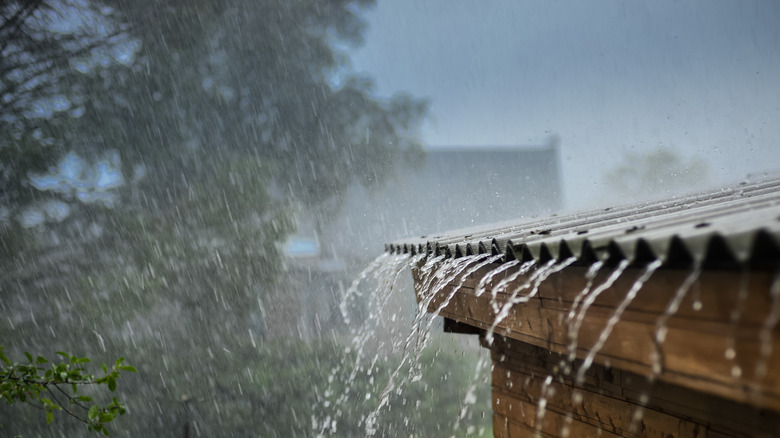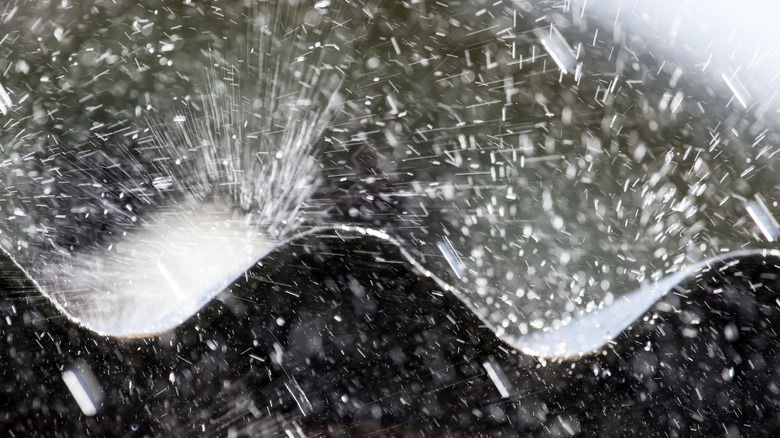How To Noise-Proof Your Home Against Heavy Rain
Since glazed windows became widespread, the subtle pitter-patter of precipitation petting the pane has been a source of comforting white noise. According to The University of Melbourne, the regularity and low frequency of the drops hitting hard surfaces mimic a lullaby, and the lethargic effect of rain sounds is well understood — hence, there are thousands and thousands of videos of rain sounds for sleeping on YouTube.
However, for some people, rain noise is a terrible distraction. Some people are naturally sensitive to sound, and some shift workers find it harder to sleep during rainstorms thanks to their schedules, according to Smart Sleeping Tips. For these folks, reducing excess rain noise can be the difference between a healthy sleep pattern and sleeping at the whim of the weather.
Then there are those who would normally find rain relaxing, but find themselves in a particular room or building that amplifies the sound of a light drizzle into a roar. In these scenarios, the materials from which the home is constructed are likely at fault. No matter which category you fall into, there are some tried and true methods for noise-proofing your home against heavy rain, and they tend to fall into one of two areas — the windows and the roof.
How to noise-proof your windows
When it comes to reducing rain noise, the problem with windows is that they are so much thinner than walls, explains Soundproof Central. Glass is actually quite a good noise absorber, but because window panes are so thin, noise can easily penetrate into the home. Therefore, the first thing to consider is whether or not you can reduce the amount of rain that is able to make contact with the window. Soundproof Panda suggests awnings or shutters that can deflect and redirect a large percentage of the rain before it has a chance to disturb you.
The most thorough — and the most expensive – way to soundproof windows is to replace the glazing, especially if it's somewhat dated, suggests Unique Windows. Double- or triple-glazed windows not only reduce noise but also help with insulating your home.
However, the cheapest and easiest area to improve your windows' noise-proofing is on the inside. Rather than upgrading the glass panes, adding insulating fabric to your curtains could help them absorb more of the noise. There are now also special noise-blocking films that can be stuck on the inside of the windows to reduce noise and UV, though this technology is relatively new, per Soundproof Living.
How to noise-proof your roof
The first thing to check when faced with a noisy roof is the fixtures and fasteners where the roof is attached to the house. An improperly installed roof can be dangerous, and even slightly loose fixtures can allow the roof to vibrate enough to generate a lot of noise. As Soundproofed points out, this is an issue that will get worse with time, as the constant expansion and contraction of your roof due to temperature changes will loosen fixtures more and more over the years.
If the roof is properly installed, but still making noise, another option is to increase the amount of attic insulation you have installed. The roof itself will still be noisy, but you'll hear it less thanks to the extra material up there intercepting the sound, explains All American Roofing. This is a sensible step to take to reduce energy loss through the roof also.
If your roof is installed well and well insulated, but still making too much noise for you, then you can consider some kind of sheeting or mats to cover the roof and absorb some of the impacts of the raindrops. According to HousingHow, elastomeric sheet insulation can reduce noise from polycarbonate rooftops by up to 90%.


